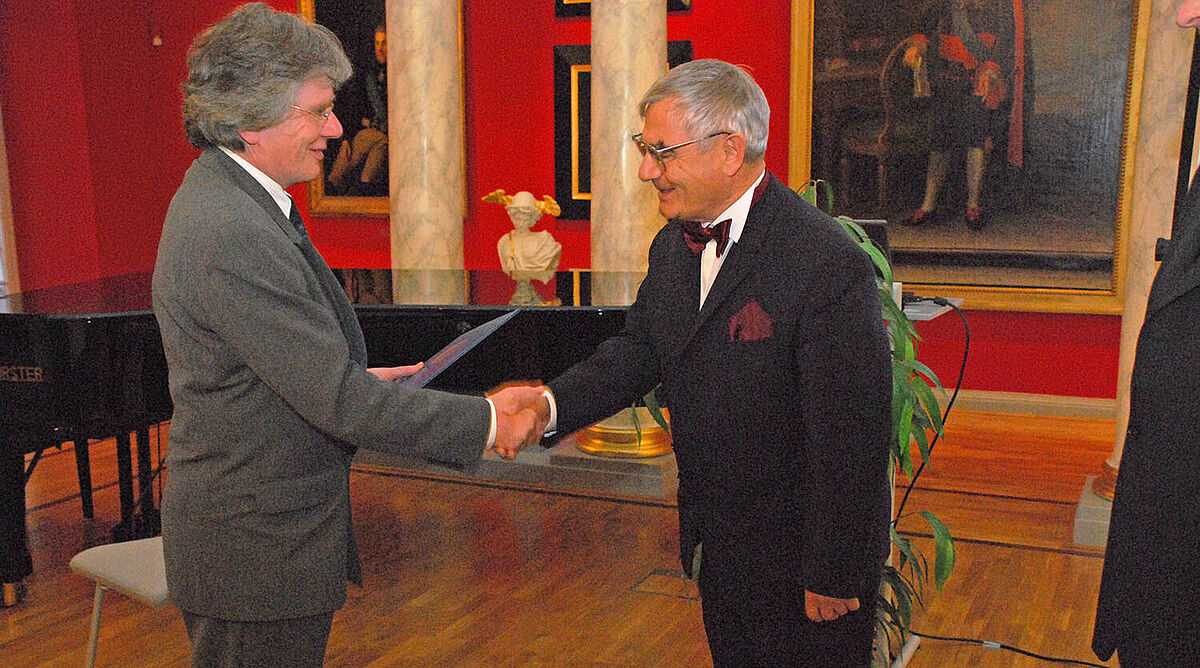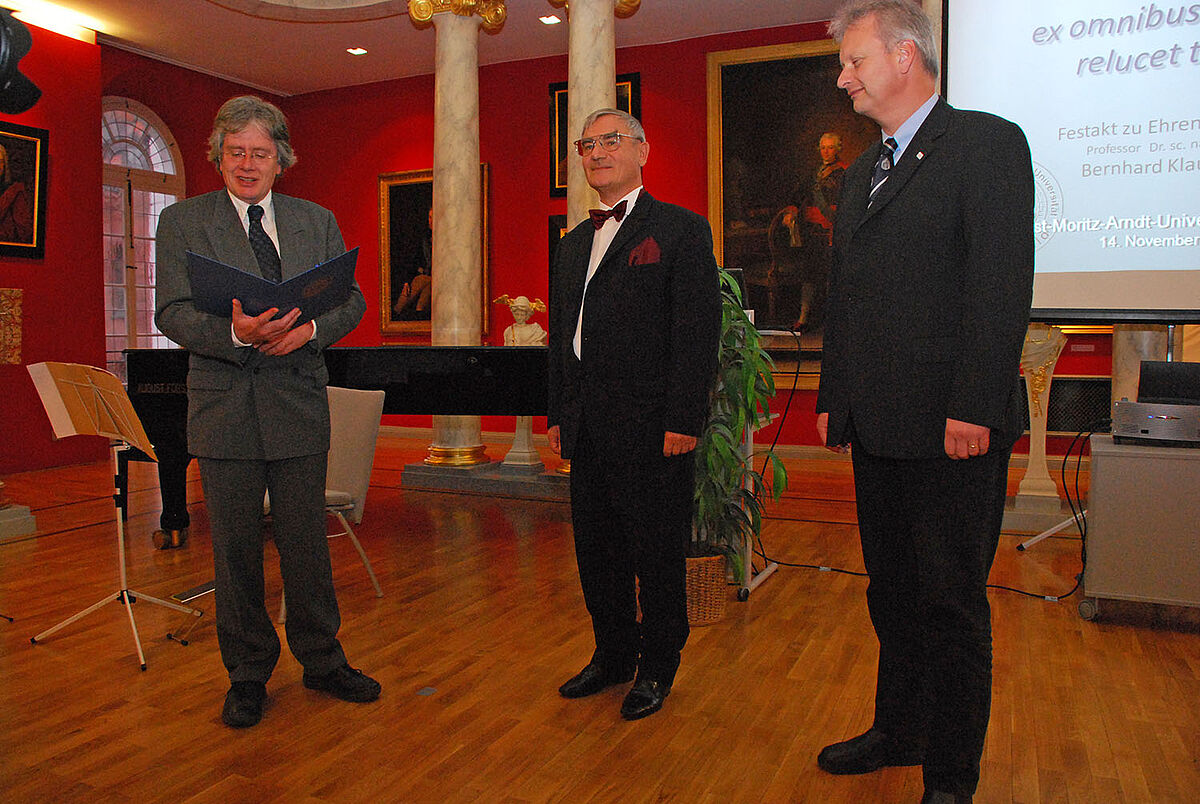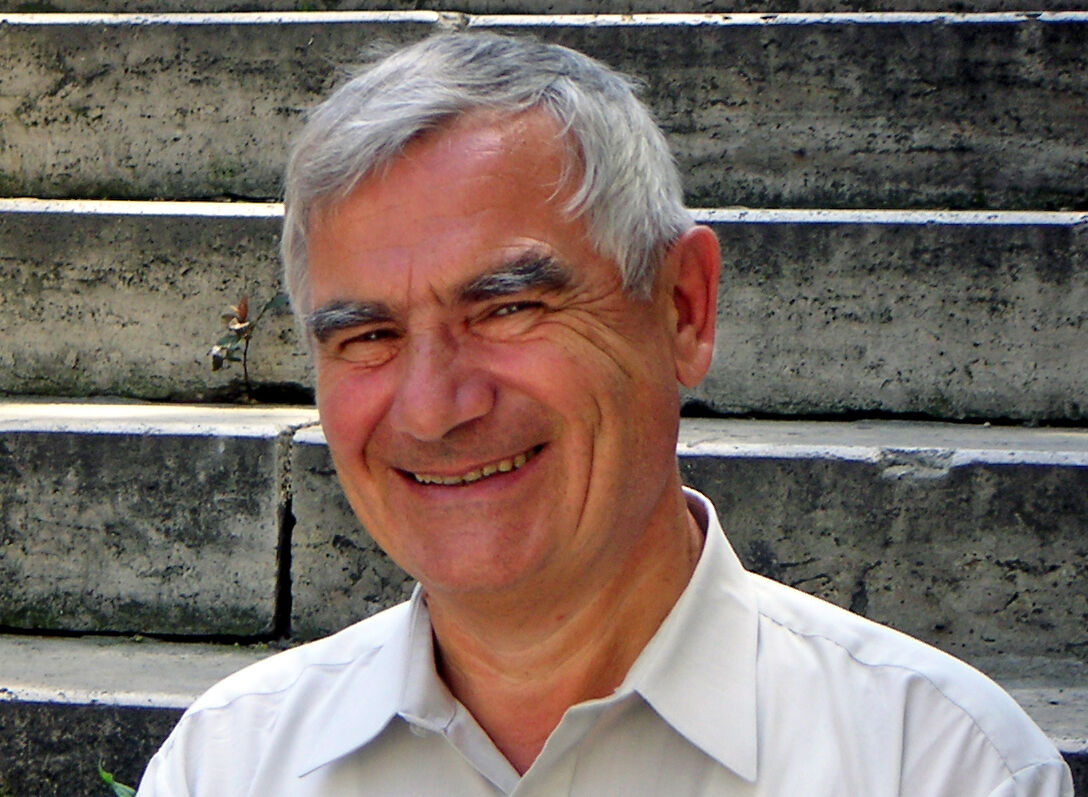Honorary Doctorate Awarded to Bernhard Klausnitzer
Zoological Institute and Museum
Loitzer Straße 26, 17489 Greifswald
Tel.: +49 3834 420 4251
zimg.sekretariatuni-greifswaldde
The zoologist Prof. Dr. Bernhard Klausnitzer from Dresden received an honorary doctorate from the Faculty of Mathematics and Natural Sciences at the University of Greifswald on 14 November 2008. He is considered the most important European expert in the study of beetles. Beetles are the most diverse group of organisms on Earth, with over 380,000 species documented to date. They are one of the most important indicator groups for many question-raising developments of our time, such as climate change, species loss and urbanisation. His colleagues from Greifswald regard him as one of Germany’s most outstanding insect researchers (entomologists).
During his scientific career, Prof. Dr. Bernhard Klausnitzer wrote around 800 scientific and popular science papers, including 26 books. He gives about 15 talks per year and is editor of two important entomological scientific journals and several book series, including the publication "Die Käfer Mitteleuropas" (The Beetles of Central Europe), which now comprises more than 30 volumes. Although the scientist has been officially retired since 2004, specialist authorities still ask him for assessments and advice. He continues to be active in international specialist associations and societies.
"I particularly appreciate the fact that he did not compile his extensive body of work in an ivory tower, but was always committed to entomology and faunistics, a branch of wildlife geography, from a scientific policy perspective and in leadership positions, also maintaining contact with the many amateur entomologists. He was always someone you could ask," says Prof. Dr. Gerd Müller-Motzfeld from the University of Greifswald.
Prof. Dr Bernhard Klausnitzer studied in Dresden under the zoologist and animal geographer Prof. Dr Ulrich Sedlag, who originated from Greifswald, and regularly visited Greifswald to give lectures or attend continuous professional development events. He was always closely associated with the Zoological Institute and Museum and also promoted the Institute's reputation as a serious and rigorous examiner of doctorates, habilitations and evaluations.
His knowledge and experience helped Greifswald’s researchers to apply for research projects, such as the large-scale project "Urban Landscape Development Greifswald", which was funded by the Federal Agency for Nature Conservation (BfN) with a total of more than DM 5 million (approx. € 2.55 million today). This research project was the BfN’s largest German urban ecology research project between 1992 and 2004.
Being able to award the honorary doctorate is an honour for the University of Greifswald’s Zoological Institute as it is one of the few university institutions in Germany that represents entomology in research and teaching and can look back on a history of more than 150 years.
Life and Career
Bernhard Klausnitzer, born on 21 October 1939 in Bautzen, sometimes had more than 30 terrariums and aquariums of his own when he was a school pupil. At the age of 18, in 1957, he became a member of the German Entomological Society. Klausnitzer studied Biology in Jena and Dresden from 1958 onwards. At the Zoological Institute of TU Dresden’s Faculty of Forestry in Tharandt, he taught the subjects of special zoology, forest entomology, soil zoology, bee studies, animal raw materials, animal ecology, basics of ecology, domestic animal studies and zoological basics of food production from 1966 to 1977.
During his time in Tharandt, he founded a student circle "Entomology", from which a number of Diplom theses emerged, along with the idea for a beginners' book "100 Tips for the Insect Lover".
Bernhard Klausnitzer began to study plant pests in his Diplom thesis. Later, he pursued the issue further and turned to biological pest control in forestry. Above all, the complicated biology of aphid-eating ladybirds, right down to the intricate biochemical details of the defence mechanisms of flowering plants and the sophisticated use of these substances by parasitic aphids as a special adaptation against their predators, the ladybirds, fascinated him throughout his entire life.
He completed his habilitation in 1974 with a study on the "Application of phylogenetic systematics within genera".
In 1977, he became a lecturer at the University of Leipzig, where he was appointed professor with the Chair of Zoo Taxonomy and Ecology in 1983. Here he founded one of the most important schools of urban ecology with a special focus on the urbanisation of animals and the management of introduced species.
When the need for his (professorial) chair was questioned during the political transformation of the University of Leipzig in 1991, he refrained from a lawsuit and remained true to his cause as a scientist. He founded a private institute for ecology and entomology. Here, he mainly concentrated on the study, biology and larvae of beetles.



